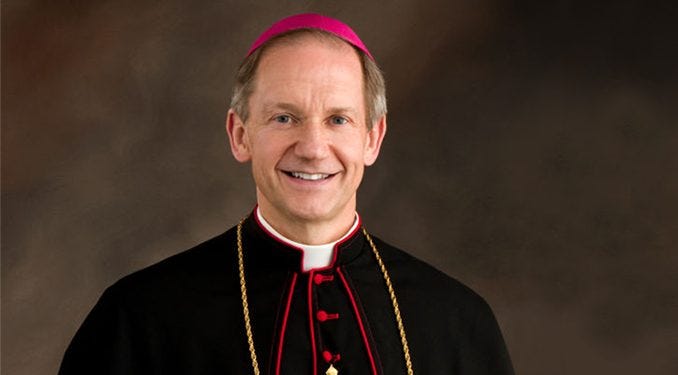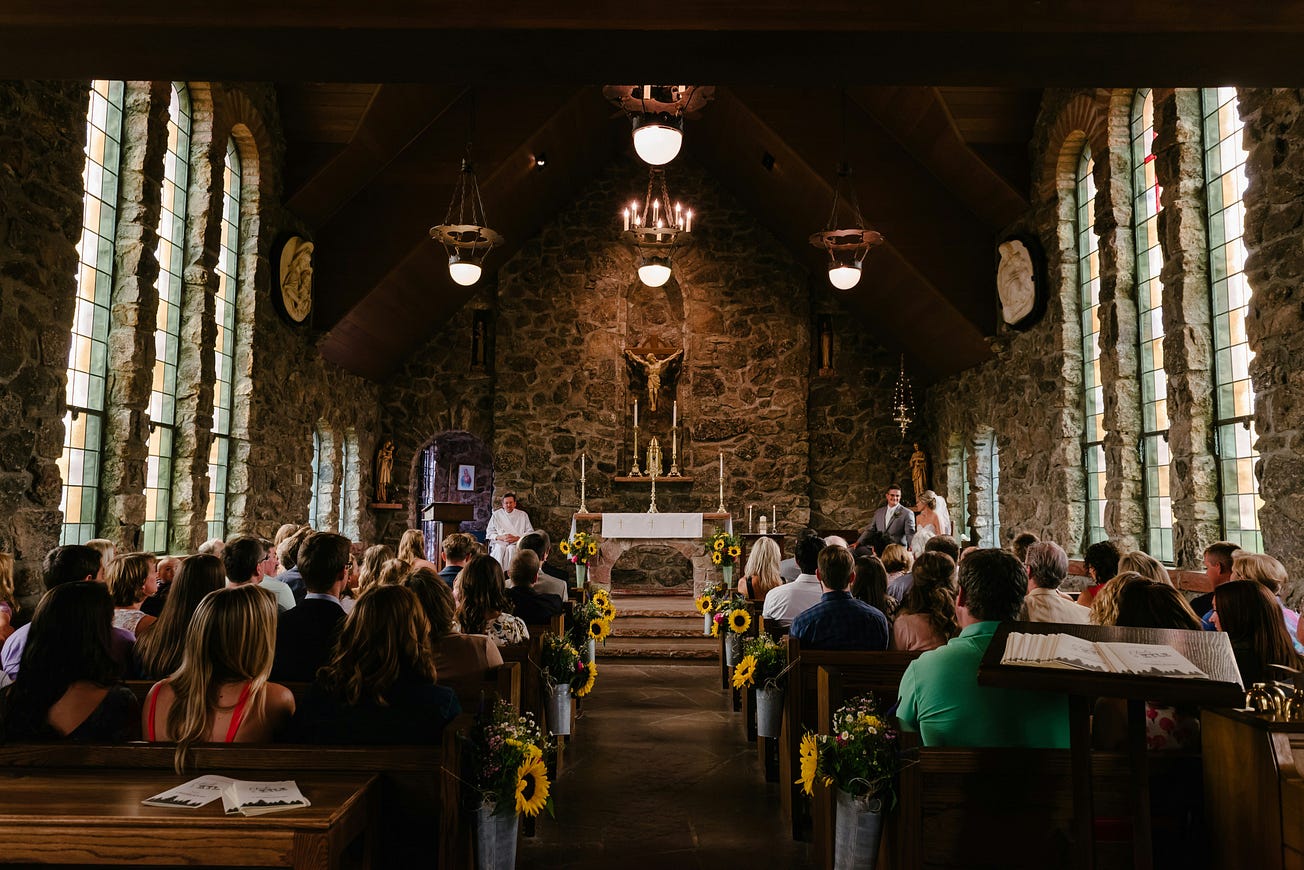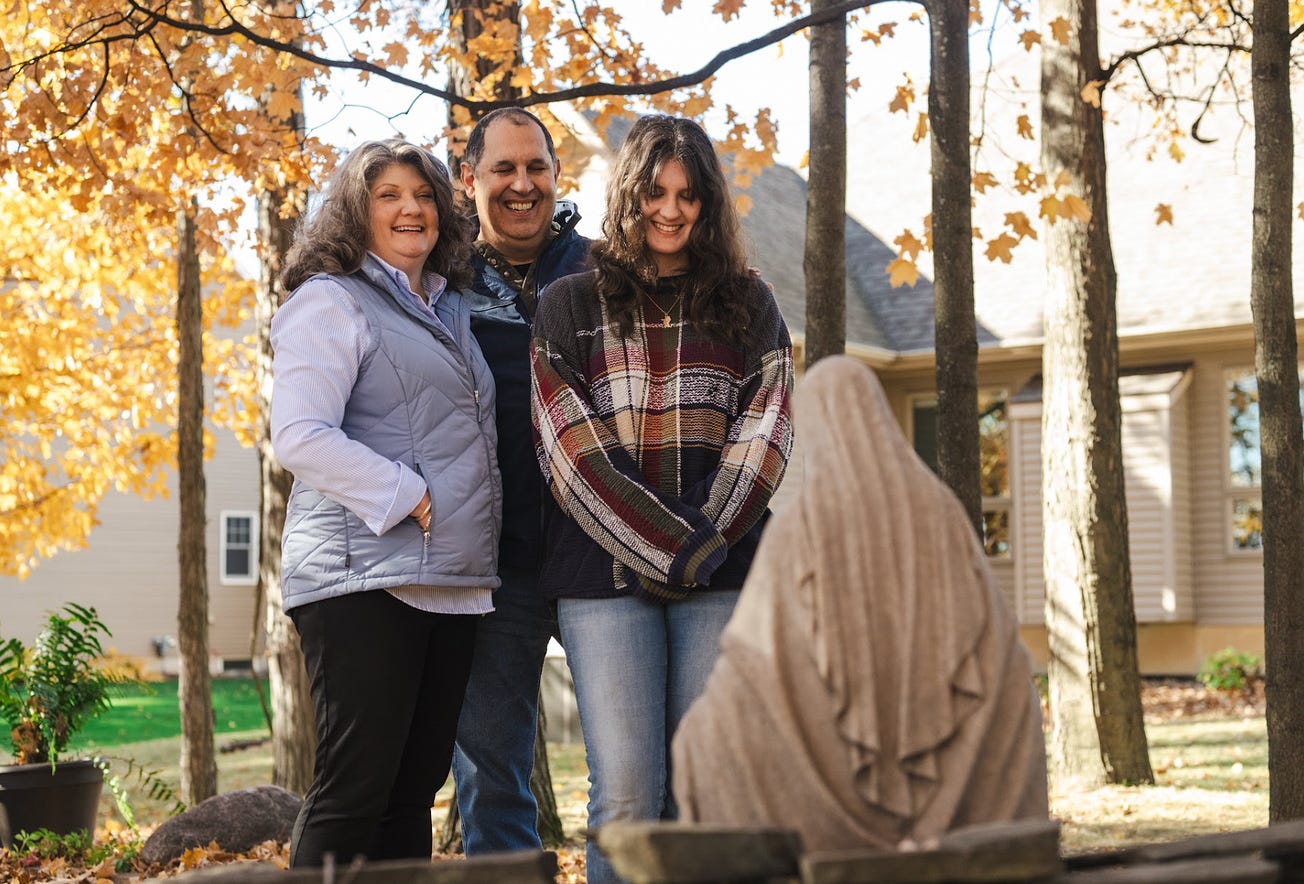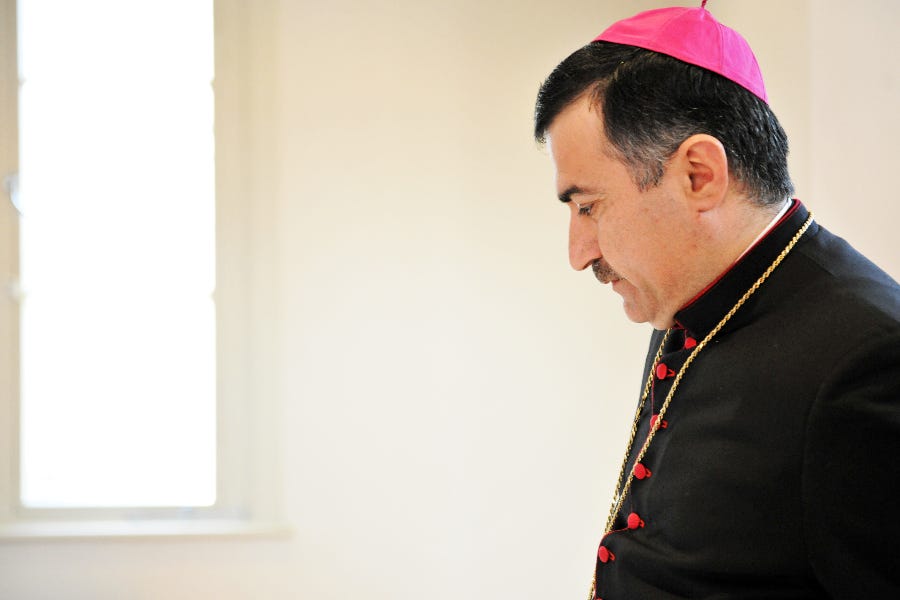When U.S. Catholic bishops met in Louisville, Kentucky, last week, they talked in a closed door session about the future of the Catholic Campaign for Human Development, a USCCB anti-poverty initiative focused on giving grants to community organizing organizations.
The program, which was founded more than 50 years ago, is facing a financial crunch, with its net assets plummeting over the last decade, and collection revenue insufficient to cover annual expenses.
While the closed-door discussion last week was only a first step, one bishop proposed after the meeting a big idea. Bishop Thomas Paprocki of Springfield, Illinois wrote in a column this week that he believes the bishops’ conference should replace the program with a new second-collection grantmaking program — the National Campaign for Catholic Education.
“Since the best way to lift people out of poverty is through a good education that will lead to gainful employment, we should let the Catholic Campaign for Human Development sunset and establish a new National Campaign for Catholic Education,” Paprocki wrote.
After his column, Paprocki spoke with The Pillar about his proposal, and whether it might be feasible at the USCCB.
This interview has been edited for length and clarity.
Bishop, you said in a diocesan newspaper column this week that it might be time to “sunset” the USCCB’s Catholic Campaign for Human Development. Why?
Well, CCHD has been in existence now for nearly 55 years. It started out as the National Catholic Crusade Against Poverty, and then it changed to the Catholic Campaign for Human Development.
So since 1969, it's been functioning in the context of the 1960s, together with the “War on Poverty.”
Iin secular society people question: Did the War on Poverty succeed? Have people been raised out of poverty?
We should ask similar questions in the Church.
This program started out as a crusade against poverty, and now it's talked about as a campaign to break the cycle of poverty. But is it effective?
That issue — effectiveness — is one of my key questions. Has there been any study of its effectiveness?
The main focus of the campaign, as I understand it, has been to fund community organizations and community organizers. And I don't have any quibble with that. I worked with community organizers on the southeast side of Chicago, and they actually helped me start the Chicago Legal Clinic, which we founded to try to help the poor.
In fact, the reason I went to law school as a young priest was because I wanted to help the poor through legal services. The United Neighborhood Organization of Southeast Chicago helped me to do that. I'm very grateful for that.
So I'm saying that these organizations can do good things, but is it the most effective way [to help the poor]?
The question is: How do you help people rise out of poverty?
I think the Catholic Church has the greatest track record in that regard through our Catholic schools — that the best way to break the cycle of poverty, to see someone rise out of poverty, is having a good education through which they can have gainful employment.
So that leads to me questioning the effectiveness of primarily funding community organizers. I am asking what we can fund that has been shown to be effective in terms of raising people out of poverty. And I believe that would be Catholic education.
I would also point out the difference between the way things were in the 1960s and the way things are now.
In the 1960s, when the Catholic Crusade Against Poverty began, we had strong Catholic schools, staffed by religious sisters.
I had a religious sister in every grade that I attended except seventh grade. Now that's totally changed. There are few religious sisters in Catholic schools anymore.
That means we have to pay higher salaries to teachers, and that means the costs go up.
That rise in costs means that many of our schools have become unaffordable and inaccessible for a lot of poor people. And in fact, many of those schools have closed.
So I think that it's very timely for us to be looking at the question of how we can help Catholic schools on a national basis.
In your diocese, you’ve replaced the annual second collection for CCHD with something local — he Diocesan Campaign for Justice and Hope.
You say that campaign aims to address “systemic injustices that contribute to poverty” by drawing from the corporal works of mercy.
How do you do that? What is the work of the DCJH?
We fund locally a number of organizations and programs that are parish-based, though not all of them are parish-based.
Some of them are pregnancy help centers, which help pregnant women, to basically give them hope for the future — for their children and their lives.
Unfortunately, many women who become pregnant turn to abortion, if they believe they don’t have the money or the support to raise a child.
So we've been offering pregnancy help centers, as a way to help women choose an alternative to abortion, and to give them hope that they can have their child and that the Church will be there to help them, to bring their child and raise their child in the world.
That's been a big focus of this.
But there are also some community-based organizations that we fund. But we do it on a local level — and the fact that this is all local gives us a better opportunity to be familiar with the programs, and what it is that we’re funding.
Bishop, since the topic of CCHD has come up in recent weeks, there has been a vigorous defense of the program from some voices in the media. And at the bishops’ meeting in Louisville, there was a small group of demonstrators, urging bishops to support CCHD.
Why do you think there has been such a staunch defense of CCHD from some corners?
Well, I think that some people rightfully see this as a way to help poor people. And I have no criticism of that. In fact, I support helping poor people myself.
As I said, my idea was to dedicate my ministry, my priesthood, to helping the poor through legal services, and the only reason I did not continue that was because my archbishop asked me to study canon law and then got me involved in chancery work.
But my idea for my priesthood, and my support, is very strongly favoriting helping the poor. And so in that sense, I don't criticize them, if perhaps they see this as the best way to help the poor, and that’s their perspective.
What I’m asking is this: “Is this really the most effective way to help the poor? Is this the most effective way? Is there a better way to do this?”
I’d like to point out that CCHD is not the only way to help the poor. There are many other ways to help the poor. We have tremendous programs through Catholic Charities USA, and Catholic Charities in individual dioceses. Many of our parishes have St. Vincent de Paul Centers.
Of course, people will say, “well, those offer a handout, they’re helping people in emergency situations.” And that’s true. And they say that an organization like CCHD is looking at how to break the cycle of poverty — the systemic roots of poverty. And it’s good for us to do that.
But again, the question is about what’s the most effective way to do that, to break the cycle of poverty, so that if someone who is growing up in a poor neighborhood, can we help make sure that their future is brighter, and they won’t have to live in poverty for the rest of their lives?
And it’s your point of view, Bishop, that the best thing the Church can offer to help break the cycle of poverty is a Catholic education?
Yes, I would argue that.
I think we can point to many success stories of people who have gone to Catholic schools in very poor communities, in which the Catholic school education they got enabled them to get very gainful employment, and not to be shackled in poverty for the rest of their lives.
I think we do have a good record on that front. And given the fact that we're currently in a position, where unfortunately many Catholic schools, especially in poor neighborhoods, have been closing, is there a way that we can save them?
I think in this regard, I think there would be strong national support for [a national campaign for Catholic education] — not just as a way of keeping Catholic schools open, but also as a way of helping the poor.
So what would a national campaign for Catholic education look like? How would you envision it being established? What kind of projects would it fund?
Well, that would be something about which we'd have to get a good group of people to sit down and think out.
My initial thoughts in that regard would be that it could be in some ways similar to the way that money is raised and distributed for the Catholic Campaign for Human Development. You’d take up a national collection, some portion of it stays in local dioceses, and then you’d have a local committee to determine how to distribute those funds.
There would be some criteria for schools and within the diocese, for example, with regard to the financial threshold need for particular parishes or schools.
Obviously we wouldn't be giving money to wealthy parishes that can support the schools on their own, but perhaps some inner city parishes where they don't have an affluent parish that can support them, there would be grants given to them.
And then on a national basis, I think we could assess grants in a way that would be comparable to the way CCHD does it, and national organizations that help Catholic education that could be supported.
You mention schools in urban poverty, but I presume the same thing could be done for schools in communities of rural poverty.
Yes, that's true.
In a diocese like ours here in Central Illinois, we cover 15,000 square miles, and most of our schools do tend to be in the more urban areas, and so Catholic education in rural areas is a question as well.
In some of those places, you could look for ways to support smaller schools, and one way of doing that is through, maybe, a hybrid between homeschooling and your typical normal school.
We've seen in recent years a lot of parents who are homeschooling their children to make sure that they get a Catholic education, especially if there's no Catholic school in the area. And some parents have formed on their own parents’ groups supporting each other, and there are some organizations that help parents of homeschoolers.
So there could be opportunities to innovate in areas like that. In some of our rural areas, we don’t have schools. And if we do have schools, they're small.
In fact, it was a mental shift for me when I came here from Chicago. In Chicago, our benchmark in the archdiocese was that if the school was under 200 students, it was in trouble — a red flag. But when I came here to Central Illinois, at some of our schools in our rural areas there'd be 50 students in the school. My antenna would go up, thinking there was a problem at the school. And they’d explain to me that, no, they’d had 50 students in the school consistently for the last 50 years. They’re used to operating a small school, with multiple grades sometimes in the same class, and they make it work.
So there are different models of Catholic education out there. And yes, that's definitely a need, not just in the inner city, but I think also in rural areas where there are not schools as we have traditionally known them.
Bishop, momentum is a powerful force in a bureaucracy. You are proposing that the bishops’ conference stop doing one thing, CCHD, and start doing another, the National Campaign for Catholic Education. That seems a very tall order.
Do you really think that you can accomplish such a big change? What steps would be required?
Well, as a matter of procedure, that's something I'm looking into myself. What initially comes to mind is that the conference has what they call a “varium process,” by which any individual member of the conference can propose a varium. So I would be looking at, maybe, drawing up some kind of proposal, perhaps getting some other bishops to join me on that, and then submitting that to the conference.
The aim would be to get that on the agenda for a broader discussion, so that it’s not something that’s just going to be decided by a subcommittee. But rather that the whole body of bishops can get into this conversation, because I think it is something that we all need to look at.
And I realize it’s taking a bit of a risk to do that.
I teach a course on leadership at the Oakley School of Business at Quincy University here in my diocese. One of the things I say to my students about leadership is that sometimes you put ideas out there, and if people follow, then you’re a leader. If they don’t follow, you’re an outlier.
So you take a risk sometimes in being a leader, that you propose ideas and you hope other people will follow and get on board with them. But if not, then you say, “Well, okay, people aren't interested, they don't want to follow, I guess then we just let it go."
But I think you have to make things happen sometimes. You have to take the risk and put an idea out there, and see if anybody else is interested in going along with it.
And have you heard from bishops who want to go along with this idea?
I have heard from some, yes. Not a lot so far, but the meeting was just last week.
Still, I've had some bishops call me or send me emails to say that yes, they’re very interested in this.
And I think there are some lay voices, as well, who are going to write or talk about that. I think it will be helpful to hear from laity — what do they think about this proposal, and what should we do with it?
I know there are Catholics out there who would say, “I don’t give to the Catholic Campaign for Human Development, but I would give to Catholic schools.”
So I think we should jump into that opportunity.




